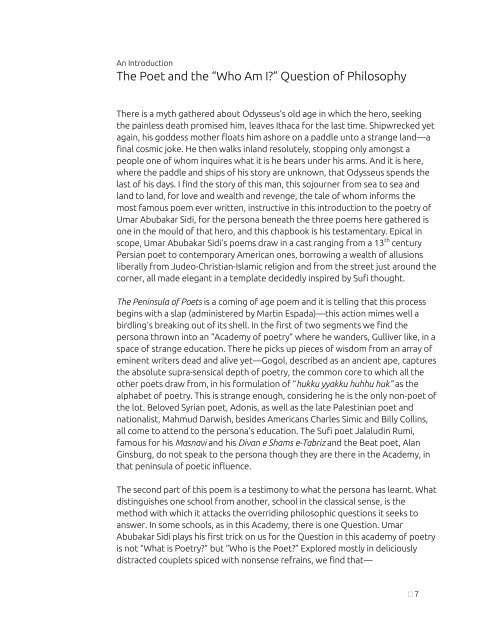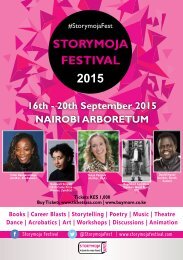Create successful ePaper yourself
Turn your PDF publications into a flip-book with our unique Google optimized e-Paper software.
An Introduction<strong>The</strong> <strong>Poet</strong> and the “Who Am I?” Question <strong>of</strong> Philosophy<strong>The</strong>re is a myth gathered about Odysseus’s old age in which the hero, seekingthe painless death promised him, leaves Ithaca for the last time. Shipwrecked yetagain, his goddess mother floats him ashore on a paddle unto a strange land—afinal cosmic joke. He then walks inland resolutely, stopping only amongst apeople one <strong>of</strong> whom inquires what it is he bears under his arms. And it is here,where the paddle and ships <strong>of</strong> his story are unknown, that Odysseus spends thelast <strong>of</strong> his days. I find the story <strong>of</strong> this man, this sojourner from sea to sea andland to land, for love and wealth and revenge, the tale <strong>of</strong> whom informs themost famous poem ever written, instructive in this introduction to the poetry <strong>of</strong><strong>Umar</strong> Abubakar <strong>Sidi</strong>, for the persona beneath the three poems here gathered isone in the mould <strong>of</strong> that hero, and this chapbook is his testamentary. Epical inscope, <strong>Umar</strong> Abubakar <strong>Sidi</strong>’s poems draw in a cast ranging from a 13 th centuryPersian poet to contemporary American ones, borrowing a wealth <strong>of</strong> allusionsliberally from Judeo-Christian-Islamic religion and from the street just around thecorner, all made elegant in a template decidedly inspired by Sufi thought.<strong>The</strong> Peninsula <strong>of</strong> <strong>Poet</strong>s is a coming <strong>of</strong> age poem and it is telling that this processbegins with a slap (administered by Martin Espada)—this action mimes well abirdling’s breaking out <strong>of</strong> its shell. In the first <strong>of</strong> two segments we find thepersona thrown into an “Academy <strong>of</strong> poetry” where he wanders, Gulliver like, in aspace <strong>of</strong> strange education. <strong>The</strong>re he picks up pieces <strong>of</strong> wisdom from an array <strong>of</strong>eminent writers dead and alive yet—Gogol, described as an ancient ape, capturesthe absolute supra-sensical depth <strong>of</strong> poetry, the common core to which all theother poets draw from, in his formulation <strong>of</strong> “hukku yyakku huhhu huk” as thealphabet <strong>of</strong> poetry. This is strange enough, considering he is the only non-poet <strong>of</strong>the lot. Beloved Syrian poet, Adonis, as well as the late Palestinian poet andnationalist, Mahmud Darwish, besides Americans Charles Simic and Billy Collins,all come to attend to the persona’s education. <strong>The</strong> Sufi poet Jalaludin Rumi,famous for his Masnavi and his Divan e Shams e-Tabriz and the Beat poet, AlanGinsburg, do not speak to the persona though they are there in the Academy, inthat peninsula <strong>of</strong> poetic influence.<strong>The</strong> second part <strong>of</strong> this poem is a testimony to what the persona has learnt. Whatdistinguishes one school from another, school in the classical sense, is themethod with which it attacks the overriding philosophic questions it seeks toanswer. In some schools, as in this Academy, there is one Question. <strong>Umar</strong>Abubakar <strong>Sidi</strong> plays his first trick on us for the Question in this academy <strong>of</strong> poetryis not “What is <strong>Poet</strong>ry?” but “Who is the <strong>Poet</strong>?” Explored mostly in deliciouslydistracted couplets spiced with nonsense refrains, we find that—7



